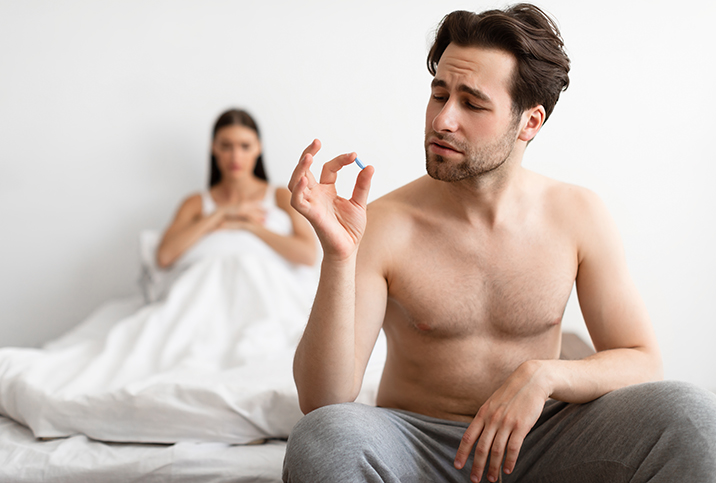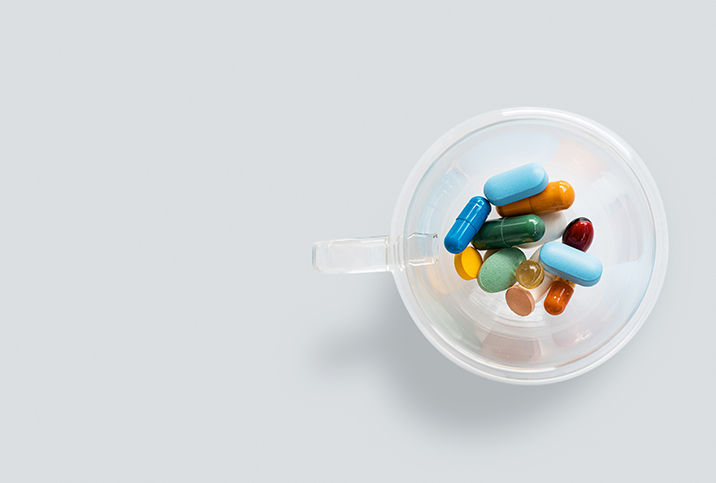What Are My Treatment and Care Options for Low Libido?

Libido is the Greek word for "desire, lust" and was first used to define sex drive in psychoanalytic behavior by the renowned neurologist and psychoanalyst Sigmund Freud in the 1890s. Nowadays, libido is more commonly defined as an individual's desire to experience sexual pleasure and/or orgasm.
Originally a biological need, libido has evolved in humans to be interwoven with a range of cultural, developmental and psychosocial factors that encompass many aspects. These range from physical and mental desires to biological functions to the driving force behind our personal and interpersonal relationships.
Libido is highly individual for each person, so its "normalcy" is about whether you have noticed a change in your own sex drive and if you're personally OK with it. However, if you have concerns, you should consult a medical professional, receive a full diagnosis and investigate various treatment options to increase your libido.
Sexuality plays a key role in leading a healthy life. Since libido is the culmination of many complex processes in the body, it can represent a key indicator of mental and physical health. After all, understanding your sexual desire and how to navigate it is part of understanding your body.
How is low libido diagnosed?
Libido naturally fluctuates due to hormones and aging. Low libido is only an issue if a person feels like it impacts their quality of life and/or is concerned about other underlying issues that may cause a sudden change in libido.
"Some medical signs and symptoms to watch for low libido are often defined by each person individually," said Lyndsey Harper, M.D., an OB-GYN and the founder of Rosy, a women's health technology company based in Texas.
If you're concerned a change in libido stems from a medical issue, address the issue as you would with other medical concerns and take steps to uncover what is wrong with the appropriate medical providers. While your primary care physician is a great resource for overall health advice, concerns with sex drive may require a specialist.
Evan Goldstein, D.O., a board-certified anal surgeon and the founder of Bespoke Surgical in New York City, recommended getting a full workup done and consulting with a medical provider who specializes in sexuality to ensure you know what is going on with your body.
"There are so many people who come to me with libido issues, and they're not doing a full workup," Goldstein said. "I think you need someone that specifically focuses on the sexual side. Which is making sure your hormones are fully checked, making sure you're seeing your gynecologist or someone specific, and if they're not sexually fully evaluating you, then you need to change."
Some symptoms of low libido you may want to discuss with your medical provider include:
- Erectile dysfunction (ED) or an inability to get or maintain an erection firm enough for sex
- Feeling concerned by the lack of sexual fantasy or activity
- Having zero interest in any kind of sexual activity, including masturbation
- Rarely or never having sexual thoughts or fantasies
During an examination, your doctor may ask you about your medical and sexual history. They may also perform a pelvic or prostate exam, recommend further blood tests to check for thyroid problems, evaluate hormone levels, and refer you to a sex therapist or specialized counselor to help determine any relationship and emotional factors that may contribute to low sex drive.
Treatment options for a low sex drive
If you've spoken to your primary care physician and a specialist—whether a gynecologist, endocrinologist, andrologist or urologist—and have undergone tests, what comes next?
Treatment options for a low sex drive are highly individual and depend on the specific cause of low libido.
"There are many proven options available to increase sex drive, including evidence-based sex and pleasure education, behavioral interventions such as cognitive-behavioral therapy (CBT), reading erotica, couples sex counseling and regular exercise," Harper said. "A visit with your doctor to take a look at your current medications or consider adding a medication or hormone to increase sex drive can also be helpful."
Some of the treatment options are similar for men and women, but others differ. Common options for women include hormone therapy, medication, and specialized counseling and sex education.
Hormone therapy
A common symptom of genitourinary syndrome of menopause (GSM) is dryness and shrinking of the vagina, which can cause discomfort during sex and lower libido. Your doctor may recommend certain hormone therapies such as estrogen supplements to relieve GSM symptoms, and this will also improve desire.
Medications
Your doctor will first review any medications you're on to evaluate potential sexual side effects. Antidepressants such as fluoxetine (Prozac, Sarafem) and paroxetine (Paxil) may reduce sex drive. As such, your doctor may switch you to a different type of antidepressant that improves sex drive such as bupropion (Wellbutrin SR, Wellbutrin XL). They may also prescribe a medication to boost your libido in addition to counseling, like bremelanotide (Vyleesi) or flibanserin (Addyi).
Specialized counseling and sex education
Speaking with a counselor or sex therapist with experience in handling sexual matters can help address underlying mental and emotional issues. Therapy is an opportunity for education regarding sexual techniques and responses, including reading material recommendations or couples' exercises.
For men concerned about low libido, common treatments include medication, specialized counseling and sex education (the same as for women), testosterone supplementation, and treating underlying medical conditions.
Medications
Just as for women with low libido, a doctor treating men with low libido will first evaluate the medications they're on. Antidepressant medications can lower libido in men and even delay orgasm. Your doctor may switch you to another antidepressant or lower the dosage. They may also prescribe you medication to stimulate blood flow to the penis to treat erectile dysfunction in conjunction with counseling.
Testosterone supplementation
If there isn't an underlying condition causing your testosterone to drop, your doctor may recommend testosterone therapy to restore testosterone levels.
Treating underlying medical conditions
Certain medical conditions may indirectly result in lower libido. For example, obstructive sleep apnea causes testosterone to drop, thus reducing the male sex drive. Treating sleep apnea in this case should restore testosterone levels and sex drive.
What are natural ways to improve libido?
There's no magic pill to improve libido. If medical concerns such as hormonal imbalances and medication side effects are addressed or ruled out, there are a number of holistic ways to attempt to raise your sex drive.
Optimize your diet and lifestyle
Eating a healthy, balanced diet while getting plenty of rest and exercising regularly improves many aspects of bodily function, including libido. A diet rich in nutrients such as zinc and omega-3 fatty acids helps improve blood flow and keeps your hormones balanced, which naturally assists with sexual desire and performance.
While regular exercise is great for libido, overtraining can have the opposite effect. This is why many endurance athletes experience dips in their libido when training hard for a competition.
Restore intimacy
Low libido may be a sign of larger issues within your relationship. Sometimes, learning how to communicate with your partner and restoring a sense of closeness may aid sexual desire. Jet Setting Jasmine, a licensed psychotherapist and sex educator based in Clearwater, Florida, said she views treatment for low libido as a way to check in with yourself and your partner, with it leading to a solution.
"We might be missing out on what may really be happening," she said. "Emotional challenges, hormonal issues, depression, anxiety, and all because they have this 'magic pill,' right? Whereas I might be disconnected from my partner's actual feelings and their real-life experience."
Couples counseling or therapy with somebody who specializes in relationship intimacy can give you more tools to restore emotional and physical intimacy in a relationship.
Exploring new avenues
Our bodies naturally change as we age. For example, vaginal penetration can become more difficult due to hormone fluctuations and erectile dysfunction becomes more common in men in their 60s, generally.
Goldstein recommended that both women and men explore new ways to experience sexual pleasure, such as anal play. He added that exploring and experiencing new kinds of pleasure creates a ripple effect that reinforces sexual desire.
"A lot of sexual libido issues that people have, whether it's erectile dysfunction or vaginal issues, anal is a great way to reinvigorate that," he added. "There's societal bias around [prostate milking], but the reality is that it's all about pleasure. When you finally tap into that pleasure, it's a positive feedback loop. It's like going to the gym."
Remember, there is no normal when it comes to libido. Each person has their own version of normal. Low libido is only an issue if you think it is. If it bothers you and affects your daily life, seek treatment.


















